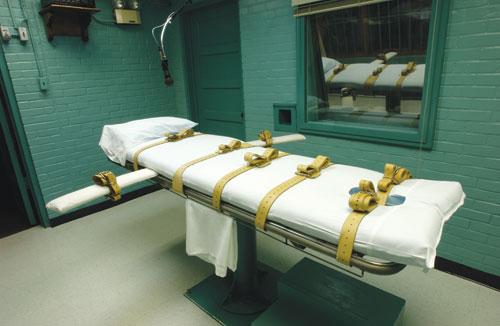
Texas is currently facing a shortage of sodium thiopental, which is one part of the three-drug cocktail used in lethal injections. Texas only has enough of the drug to carry out the two executions scheduled at the end of this month. (Provided by Texas Department of Criminal Justice)
Texas is facing a shortage of a key component of the cocktail used in lethal injections – sodium thiopental. With an angry European Union beginning to ban exports of the drug, Texas has been left with only enough to carry out two lethal injections scheduled for the end of this month.
Texas’ shortage comes as a result of Hospira, the only American producer of sodium thiopental, which announced that it would no longer produce the drug, which was to be manufactured in an Italian plant.
But after Italian authorities wanted Hospira to insure that the drug would not be used in lethal injections, the company decided to shut down production because it has “no other viable plants” where the product can be produced, Daniel Rosenburg, a spokesperson for Hospira said.
He said that because the drug is sold through wholesalers, it is almost impossible to keep track of where it goes.
“Unfortunately, there is no way for our trading partners to monitor or control what their thousands of customers in the the medical community do with the product after they obtain it, including potentially selling it to prisons,” Rosenburg said.
Sodium thiopental, which Hospira marketed under the name Pentothal, is one of three drugs used in the lethal injection process. Sodium thiopental is an anesthetic that renders the person unconscious before two other drugs are injected that stop the heart and lungs leading to death.
According to Rosenburg, Hospira never condoned the use of Pentothal in lethal injections.
“Hospira regularly contacted every U.S. state to make clear that we produced the drug to improve lives and don’t approve of the use of our drugs in capital punishment,” Rosenburg said.
Hospira last reached out to states in a 2010 letter, which was scanned and put online by Amnesty International. The letter said that while the company understood that states received the drugs “through a variety of sources without ordering directly from Hospira” they felt it was important to relay their position against using its products in capital punishment procedures.
But Hospira’s decision puts Texas, which leads the country in the amount of lethal injections carried out per year, in a bind. With only enough of the drug to carry out two more executions, Texas must act fast if it is to carry on its record of capital punishments.
Senator John Carona, who represents the SMU area, spoke about Texas’ predicament in a recent interview.
He said that he is supportive of the death penalty as he feels it is “a just punishment for those convicted of certain heinous crimes,” and that the Texas Department of Criminal Justice (TDCJ) is currently “evaluating their options for replacing
sodium thiopental.”
But other states that have found alternatives are still facing problems.
Ohio and Oklahoma both turned to pentobarbital, a drug with similar affects to sodium thiopental, as a replacement. Oklahoma uses it in a three-drug cocktail similar to Texas’ cocktail, and Ohio uses it in a one-drug overdose.
But pentobarbital is also only produced by one company operating in the U.S., Lundbeck Inc., which is based in Denmark.
Denmark has long opposed the death penalty, and recently asked both Oklahoma and Ohio to discontinue the drug’s use in lethal injections. Neither state has any plans to comply with their request.
Rick Halperin, director of SMU’s human right’s program, said he believes Texas will most likely turn to an overdose of one drug to solve its lethal injection problems. He does not believe that Texas will turn back to methods other than lethal injection, such as hanging or the electric chair, to get back on track.
But he said he “won’t be surprised” if efforts are made in the Texas Legislature that espouse other methods after Texas’ problem begins to drastically slow down the rate of executions.
“That will come out of stupidity and frustration of the slow pace of killings,” Halperin said. “I have no doubts that we will sink to the lowest common denominator in time.”
Rep. Dan Branch, who represents the SMU-area in the Texas House, said that he approves of “humane delivery of capital punishment.” He said that since Hospira has decided to stop production, Texas will simply have to look for the “next alternative.”
He said that this may even present an opportunity for other manufacturers to produce the drug in the United States.
But, until that happens, the United States may continue to face a shortage. The European Union is currently in talks over banning the exportation of sodium thiopental to be used in lethal injections. The United Kingdom and Italy have already taken this step.
Halperin said that, eventually, the international opposition to the death penalty will catch up to Texas, but that it is too soon to have any real impact. Branch disagrees, saying that international opinion will have no impact on Texas’ decision to move forward with the death penalty at any time.














